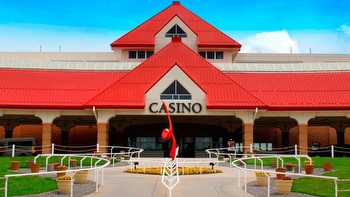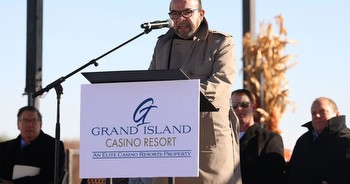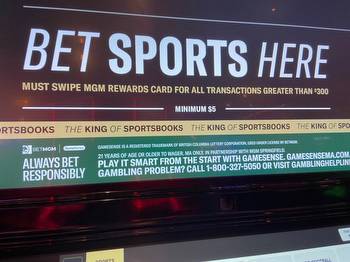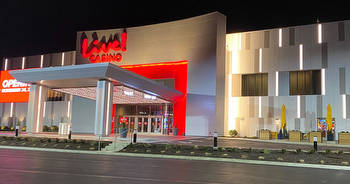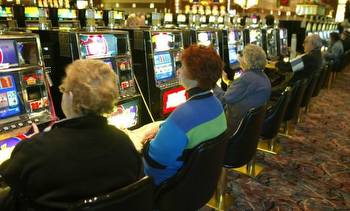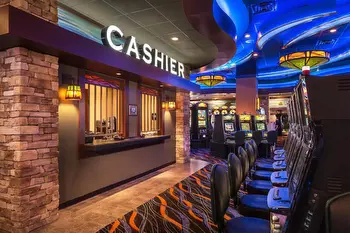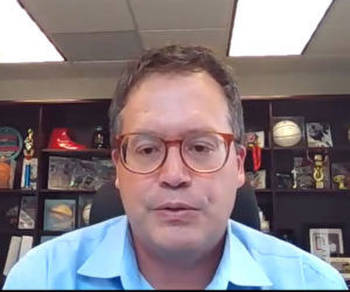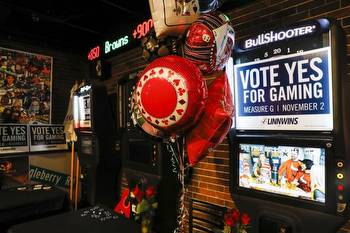KCCI Investigates: Problem gamblers slipping through state program, still spending money in Iowa
THOUSANDS OF PEOPLE IN IOWA HAVE TOLD THE GAMING COMMISSION THEY SHOULD NOT BE AT A CASINO OR GAMBLE AT ALL. THE PROGRAM IS SUPPOSED TO STOP THEM FROM BEING ABLE TO PULL A SLOT MACHINE OR ROLL THE DICE. ANYONE SIGNED UP FOR THE VOLUNTARY SELF-EXCLUSION PROGRAM COULD BE CHARGED WITH TRESPASSING IF THEY’RE CAUGHT. THAT’S IF THEY’RE CAUGHT. WE FOUND OUT HOW EASY IT IS TO BE IN THE PROGRAM AND STILL GAMBLE AWAY TENS OF THOUSANDS OF DOLLARS. DO YOU BELIEVE YOU HAVE A GAMBLING ADDICTION? OH, YEAH, YEAH, YEAH, FOR SURE. DANNY FOSTER IS ADDICTED TO WINNING A JACKPOT. HE CAN’T COLLECT FOR EVERY TIME THAT I’VE HIT BIG. THEY END UP TELLING ME THAT I’M NOT ALLOWED TO BE THERE. THAT JACKPOT. INSTEAD GOES TO THE STATE. AND DANNY, AFTER SHOWING HIS I.D., IS ESCORTED OUT. HE’S ONE OF ROUGHLY 9000 IOWANS SIGNED UP FOR THE STATE’S VOLUNTEER SELF-EXCLUSION PROGRAM. IT’S MEANT TO HELP AND DETER PROBLEM GAMBLERS FROM GAMBLING. THE PROGRAM ALLOWS DANNY TO VOLUNTARILY SAY HE SHOULDN’T BE AT A CASINO. BUT HE IS STILL SLIPPING THROUGH THE CRACKS TO THE TUNE OF 50, PROBABLY 50 GRAND IN THE LAST YEAR. PROBABLY, YEAH. IT’S A LOT OF MONEY. YEAH. TELL ME ABOUT IT. YEAH, I MEAN, I’M. I’LL BE THE FIRST ONE TO SAY I DEFINITELY GOT A GAMBLING PROBLEM. THE MONEY GONE. THE WINNINGS INSTEAD GOING TO THE STATE’S GENERAL FUND ACCORDING TO THE LAW. DANNY ADMITS HE WAS AT PERRY MEADOWS CASINO IN ALTOONA JUST A COUPLE OF WEEKS AGO. I MEAN, THEY DON’T IDEA THAT YOU JUST WALK IN THERE AND YOU CAN SPEND YOUR MONEY AND JUST CAN’T WIN ANY. YEAH. WHICH IS KIND OF, IN MY OPINION, FEEDS THE PURPOSE OF THE PROGRAM. IT’S REALLY BEEN HARD FOR OUR MARRIAGE. I MEAN, WE’VE BEEN TOGETHER A LONG TIME. I MEAN, ALMOST TEN YEARS. SO. SO WE’RE TRYING TO WORK THINGS OUT. SO I HOPE WE CAN. I REALLY. AND I HOPE AGAIN. CASINOS IN IOWA ARE NOT LEGALLY REQUIRED TO ASK FOR AN I.D. BEFORE SOMEONE ENTERS THE GAMING FLOOR WHERE PEOPLE LIKE DANNY ARE NOT SUPPOSED TO GO. THEY ARE REQUIRED TO SHOW AN ID ONCE THE JACKPOT IS HIT. AN EXPENSIVE CASH TRANSACTION IS MADE. OR IF SOMEONE WANTS A PLAYER’S CLUB CARD, IT IS IN THOSE SITUATIONS WHERE THE CASINOS ARE REQUIRED TO CHECK THE ID AGAINST THE STATEWIDE SELF-EXCLUSION PROGRAM AND IDENTIFY INDIVIDUALS THAT MAY BE ON THE LIST. BRIAN IROKO IS THE ADMINISTRATOR FOR THE IOWA RACING AND GAMING COMMISSION, A COMMISSION THAT OVERSEES CASINOS AND OTHER GAMING IN THE STATE, INCLUDING THE VOLUNTARY SELF EXCLUSION PROGRAM. IROKO ADMITS IT MAY BE TOUGH FOR CASINOS TO RECOGNIZE DANNY OR ANY OTHER. THE 9000 AND IOWANS ON THE LIST WITHOUT SCANNING THEIR ID. MANY CASES, IT IS VERY DIFFICULT FOR A CASINO TO JUST IDENTIFY A PERSON THAT’S ON A LIST THAT COMES TO A CASINO, WHETHER THEY’RE JUST GAMBLING IN A SLOT MACHINE WHERE THERE’S NOT ANY NECESSARILY ANY EMPLOYEE INTERACTION OR EVEN AT A TABLE GAME WHERE THERE’S LIMITED EMPLOYEE INTERACTION. THE IRGC DOES TRACK VIOLATIONS OF THE PROGRAM. IT’S DISHED OUT MORE THAN $194,000 IN FINES IN THE LAST THREE YEARS TO PLACES LIKE DIAMOND JOE CASINO IN WIRTH COUNTY, WILD ROSE IN CLINTON, EMMITSBURG AND JEFFERSON, AND THE SAME CASINO THAT DANNY SAYS HE KEEPS GOING TO PRAIRIE MEADOWS. PERRY MEADOWS DECLINED OUR REQUEST FOR AN INTERVIEW, BUT DID SEND A STATEMENT SAYING, QUOTE, PRAIRIE MEADOWS IS COMMITTED TO RESPONSIBLE GAMING. WE ENCOURAGE ANYONE WITH A PROBLEM GAMBLING TO SEEK ASSISTANCE FROM 800 BETS OFF AND QUOTE WHAT THE IRGC DOESN’T TRACK IS THE SAME THING THAT KEEPS HAPPENING TO DANNY. WHEN SOMEONE IN THE PROGRAM GETS TURNED AWAY AFTER PRESENTING THEIR ID. WOULDN’T THAT SHOW THE SUCCESS OF THE PROGRAM? WHY WOULDN’T YOU RECORD HOSE? SO IT’S A GOOD QUESTION. AND SO, YOU KNOW, MAYBE IT IS SOMETHING THAT WE SHOULD GET RECORDS OF. I WOULD SAY THAT THE SUCCESS OF THE PROGRAM REALLY, YOU KNOW, WE THINK ONE OF THE MEASURES IS IS JUST HAVING 100% COMPLIANCE FROM THE CASINOS. A CASINO ALLOWING DANNY OR OTHERS TO GAMBLE UNTIL THEY HIT THE JACKPOT IS COMPLYING WITH THE STATE LAW. I WOULD LIKE TO SEE IF THEY DID START IDING EVERYBODY AND ARRESTING PEOPLE THAT ARE ON THE SELF-EXCLUSION. HE AND HIS WIFE SAY THAT CHANGE IN THE LAW WOULD SOLVE A PROBLEM FOR DANNY AND POTENTIALLY THOUSANDS OF OTHERS IN THE PROGRAM. ADDICTED TO GAMBLING AND JUST REALLY THINK THAT WOULD HAVE A VERY POSITIVE IMPACT ON A LOT OF PEOPLE. NOW, ANOTHER RECENT WRINKLE IN THE LAW. ANYONE CAN GAMBLE RIGHT HERE IN THE PALM OF THEIR HAND WITH SPORTS GAMBLING. ROCCO SAYS GAMBLING APPS ARE REQUIRED JUST LIKE CASINOS TO MAKE SURE NO ONE IN THE PROGRAM IS USING THEM. CASINOS ARE REQUIRED TO TRAIN THEIR WORKERS TO COMPLY WITH THE IRGC LAW, WHICH ALSO INCLUDES UPDATING THE LIST OF PEOPLE IN THE PROGRAM. ONCE EACH WEEK. BUT AGAIN, THEY’RE NOT REQUIRED TO SHOW ID OR ID SOMEONE BEFORE THEY WALK ON THE GAMING FLOOR. THAT’S HOW DANNY AND POTENTIALLY OTHERS ARE FALLING THROUGH THE CRACKS. IF YOU OR SOMEONE YOU KNOW IS ADDICTED TO GAMBLING, YOU CAN CALL YOUR LI
KCCI Investigates: Problem gamblers slipping through state program, still spending money
Thousands of Iowans have told the Iowa Racing and Gaming Commission they should not be at a casino, or gamble at all in the state.A total of 9,000 people have signed up for what's called the Voluntary Self-Exclusion Program. If they're in the program and are caught when they show an ID at an Iowa casino or gaming floor, they will be escorted out, and can be charged with criminal trespassing. But, a KCCI investigation found out, Iowa casinos aren't required to ask for an ID for someone to get onto a gaming floor and gamble. Meaning, someone in the program can gamble away until they are required to show an ID, in situations involving a jackpot win, players club card and more.Danny Foster is on the program, and says he's the first to admit he's addicted to gambling."Every time I hit big, they end up telling me I'm not allowed there," he said. "So, I mean, I pretty much leave without the jackpot."The jackpot, according to the state law, goes to Iowa's general fund. Still, Danny says he can get onto a gaming floor and gamble away. Last year, despite being in the program, he claims to have spent $50,000 to win a jackpot he can't collect."I'll be the first one to say I definitely have a gambling problem," he said."It's been hard on our marriage," his wife Diane said. "I mean, we've been together a long time, almost ten years. We're trying to work things out."Danny admits he was gambling at Prairie Meadows Casino in Altoona just a couple of weeks ago."I mean, they don't ID you," he said. "You can spend money, you just can't win any."Which, is kind of, in my opinion, defeats the purpose of the program," Dianne added.Casinos aren't legally required to ask for an ID before someone enters the gaming floor, where people like Danny aren't supposed to go. But, they are required to show ID once a jackpot is hit, an expensive cash transaction is made, or if someone wants a players club card."It is in those situations where the casinos are required to check ID against the statewide self-exclusion program," said Brian Ohorilko, the administrator of the Iowa Racing and Gaming Commission, which oversees the program.Ohorilko admits it may be tough for casinos to recognize Danny, or any others in the program, without scanning their ID."In many cases, it is very difficult for a casino to just identify a person that's on a list that comes to a casino," he said. "Whether they're just gambling in a slot machine, where there's not necessarily any employee interaction. Or, even at a table game where there's limited employee interaction."The IRGC does track violations of the program. It has dished out $194,500 in fines in the last three years to places like Diamond Jo Casino in Worth County, Wild Rose in Clinton, Jefferson and Emmetsburg. Plus, the casino Danny says he keeps going to, Prairie Meadows. Prairie Meadows received a $5,000 fine on April 18, 2020, and a $10,000 fine on March 10, 2020. KCCI Investigates has reached out to the IRGC for more documentation regarding those two fines, but we have not heard back.Prairie Meadows declined a request for an interview, but did send a statement."Prairie Meadows is committed to responsible gaming," said Cyndi Fisher, director of marketing for Prairie Meadows in an email. "We encourage anyone with a problem gambling, to seek assistance from 800-BETS OFF."What the IRGC doesn't track is when someone in the program comes to a casino, shows their ID, and is escorted out. When asked why the IRGC doesn't track that, and if that would show the success of the program, Ohorilko said it's a good question."So, you know, maybe it is something we should get records of," he said. "I would say that the success of the program, one of the measures is 100% compliance from the casinos."A casino allowing Danny, or any others, to gamble until they hit the jackpot and have to show their ID is still complying with the law."I would like to see if they did start IDing everybody and arresting people on the self-exclusion," Diane said.The Fosters agree a change in the law to ID anyone who steps foot on a gaming floor would solve a problem for Danny, and potentially others in the program.Ohorilko says it's not that easy."I think you could get into privacy concerns," he said. "I think there are also customers who will do things to disguise if they are truly on that list."Another recent wrinkle in the law, anyone can gamble in the palm of their hands with the recent change to make sports betting legal. Ohorilko says gambling apps are required, just like casinos, to make sure no one in the program is using them. Casinos are required to train their workers to comply with the law, which also includes updating the list of people each week.If you, or someone you know is addicted to gambling, you can visit Your Life Iowa, or call 1-800-bets-off.
Thousands of Iowans have told the Iowa Racing and Gaming Commission they should not be at a casino, or gamble at all in the state.
A total of 9,000 people have signed up for what's called the Voluntary Self-Exclusion Program. If they're in the program and are caught when they show an ID at an Iowa casino or gaming floor, they will be escorted out, and can be charged with criminal trespassing.
But, a KCCI investigation found out, Iowa casinos aren't required to ask for an ID for someone to get onto a gaming floor and gamble. Meaning, someone in the program can gamble away until they are required to show an ID, in situations involving a jackpot win, players club card and more.
Danny Foster is on the program, and says he's the first to admit he's addicted to gambling.
"Every time I hit big, they end up telling me I'm not allowed there," he said. "So, I mean, I pretty much leave without the jackpot."
The jackpot, according to the state law, goes to Iowa's general fund.
Still, Danny says he can get onto a gaming floor and gamble away. Last year, despite being in the program, he claims to have spent $50,000 to win a jackpot he can't collect.
"I'll be the first one to say I definitely have a gambling problem," he said.
"It's been hard on our marriage," his wife Diane said. "I mean, we've been together a long time, almost ten years. We're trying to work things out."
Danny admits he was gambling at Prairie Meadows Casino in Altoona just a couple of weeks ago.
"I mean, they don't ID you," he said. "You can spend money, you just can't win any.
"Which, is kind of, in my opinion, defeats the purpose of the program," Dianne added.
Casinos aren't legally required to ask for an ID before someone enters the gaming floor, where people like Danny aren't supposed to go. But, they are required to show ID once a jackpot is hit, an expensive cash transaction is made, or if someone wants a players club card.
"It is in those situations where the casinos are required to check ID against the statewide self-exclusion program," said Brian Ohorilko, the administrator of the Iowa Racing and Gaming Commission, which oversees the program.
Ohorilko admits it may be tough for casinos to recognize Danny, or any others in the program, without scanning their ID.
"In many cases, it is very difficult for a casino to just identify a person that's on a list that comes to a casino," he said. "Whether they're just gambling in a slot machine, where there's not necessarily any employee interaction. Or, even at a table game where there's limited employee interaction."
The IRGC does track violations of the program. It has dished out $194,500 in fines in the last three years to places like Diamond Jo Casino in Worth County, Wild Rose in Clinton, Jefferson and Emmetsburg. Plus, the casino Danny says he keeps going to, Prairie Meadows. Prairie Meadows received a $5,000 fine on April 18, 2020, and a $10,000 fine on March 10, 2020. KCCI Investigates has reached out to the IRGC for more documentation regarding those two fines, but we have not heard back.
Prairie Meadows declined a request for an interview, but did send a statement.
"Prairie Meadows is committed to responsible gaming," said Cyndi Fisher, director of marketing for Prairie Meadows in an email. "We encourage anyone with a problem gambling, to seek assistance from 800-BETS OFF."
What the IRGC doesn't track is when someone in the program comes to a casino, shows their ID, and is escorted out.
When asked why the IRGC doesn't track that, and if that would show the success of the program, Ohorilko said it's a good question.
"So, you know, maybe it is something we should get records of," he said. "I would say that the success of the program, one of the measures is 100% compliance from the casinos."
A casino allowing Danny, or any others, to gamble until they hit the jackpot and have to show their ID is still complying with the law.
"I would like to see if they did start IDing everybody and arresting people on the self-exclusion," Diane said.
The Fosters agree a change in the law to ID anyone who steps foot on a gaming floor would solve a problem for Danny, and potentially others in the program.
Ohorilko says it's not that easy.
"I think you could get into privacy concerns," he said. "I think there are also customers who will do things to disguise if they are truly on that list."
Another recent wrinkle in the law, anyone can gamble in the palm of their hands with the recent change to make sports betting legal. Ohorilko says gambling apps are required, just like casinos, to make sure no one in the program is using them. Casinos are required to train their workers to comply with the law, which also includes updating the list of people each week.
If you, or someone you know is addicted to gambling, you can visit Your Life Iowa, or call 1-800-bets-off.









